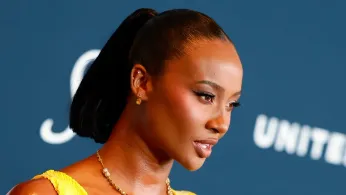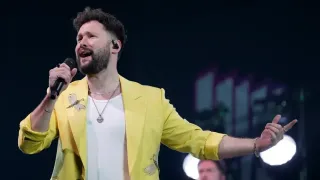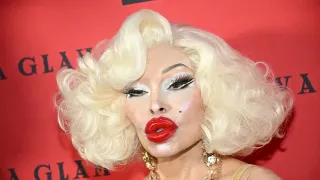
4 hours ago
Kayla Nicole’s Apology: When Old Tweets Collide with New Queer Realities
READ TIME: 4 MIN.
It’s the kind of drama that could only unfold in the age of memes, NFL romance, and Swiftie sleuthing. Kayla Nicole, sports host and influencer, found herself at the center of a digital firestorm after old tweets—containing racist and homophobic remarks—were unearthed by Taylor Swift’s legion of online detectives. What followed was not just another round of cancellation but a moment that felt uniquely resonant for queer audiences: a public reckoning with words, identity, and the ever-elusive promise of change.
Nicole’s Twitter account vanished into the ether after screenshots from 2010 to 2014 began circulating. The posts included slurs, insensitive jokes, and language targeting people of color and LGBTQ+ folks—a painful reminder of how casual online hate used to be, and how much it still stings when it resurfaces in the present . Screenshots revealed Nicole referring to a woman as a “dumb fat Mexican hoe,” retweeting offensive stereotypes about Asian people, and targeting an “Indian girl praying/chanting through the walls.” Homophobic slurs peppered the timeline—a stark contrast to the affirming, intersectional language that queer communities fight for today .
For LGBTQ+ people, especially those of color, apologies for past hate can land like a double-edged sword: necessary, but never enough. The digital era has given the queer community unprecedented power to call out old wounds—and demand more than just recycled PR statements. The public apology from Nicole is, in a way, a test of what growth looks like when the receipts are public and the pain is real.
Nicole’s statement, posted on Instagram, reads: “I want to take a moment to sincerely apologize for the hurtful tweets I posted so many years ago. Seeing them resurface last week has been incredibly difficult, and reading them now, I'm ashamed that I ever thought or spoke that way. They were ignorant, hurtful and completely wrong.”
She continues, “The woman I am today would never use those words or express those kinds of views… I have since deleted those tweets and my X account entirely, because I refuse to keep that energy alive or contribute to a cycle of hate.”
For many, the language of “energy” and “cycles of hate” feels familiar—a vocabulary borrowed from wellness circles and queer discourse alike. But will words be enough?
The resurgence of Nicole’s tweets was catalyzed by a Halloween costume that fans interpreted as a veiled dig at Taylor Swift, Kelce’s current partner. Dressed as Toni Braxton from the “He Wasn’t Man Enough” video, Nicole recreated lyrics about moving on from an ex—a playful gesture that Swifties read as “shade.” The costume, and the subsequent online sleuthing, reveal how queer-coded drama operates in pop culture: everything is a performance, every post a potential subtweet .
But for queer audiences, the real story isn’t about who threw the best shade—it’s about accountability, and whether high-profile figures can ever truly atone for harm done to marginalized communities.
In her apology, Nicole says: “My heart, values, and perspective are completely rooted in empathy, love, and respect for others. I can’t change the past, but I will continue showing through my actions who I’ve become and what I stand for today.”
This is the language of transformation—one that queer communities have championed for decades. The ability to grow, learn, and evolve is at the heart of queer liberation. But it’s also fraught: apologies must be followed by action, and public figures must prove that their newfound empathy isn’t just performative.
Nicole’s decision to delete her X (formerly Twitter) account was framed as a refusal “to keep that energy alive or contribute to a cycle of hate.” It’s a gesture many queer people recognize—the need to break with toxic pasts, even when the receipts are digital and indelible.
The queer experience of online hate is as old as the internet itself. For trans, non-binary, and queer people of color, the digital world has been both a sanctuary and a battleground. Nicole’s apology—however genuine—lands amid years of conversations about microaggressions, platform accountability, and the responsibility of influencers to do better.
What sets this moment apart is the sheer velocity of the backlash. Within hours, the court of public opinion was in session. Memes, TikToks, and threads dissected every angle, from Nicole’s intentions to her responsibility as a public figure . For queer communities, this is more than gossip—it's a reminder that visibility comes with scrutiny, and that being “unproblematic” is an aspiration, not a guarantee.
Nicole herself has said in past interviews, “I’m unproblematic. I mind my business. I don’t start drama.” Yet here she is, facing the consequences of words spoken in another era. The question for LGBTQ+ audiences is: how do we hold space for growth without letting harm slide?
Nicole’s apology has sparked debate over what true accountability looks like in 2025. For some, deleting a social media account and issuing a statement is a bare minimum. For others, it’s a step—one that must be followed by real work, especially given the history of racism and homophobia in both sports and influencer culture.
The queer community knows that apologies are just the beginning. The work of healing, educating, and creating safe spaces is ongoing. Nicole’s promise to “show through my actions who I’ve become” is an invitation—one that LGBTQ+ fans will watch closely.
As this story continues to unfold, it’s worth remembering: the internet never forgets, but it can forgive. For Nicole and the queer folks who felt the sting of her words, the hope is for transformation, not just damage control.






